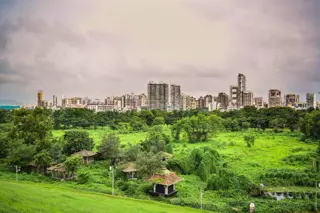Changing Kerala’s Urban Scene: Major Regulatory Updates
 Kerala’s recent updates to building regulations show a big move toward sustainable urban growth and smart use of resources. These changes, announced as part of bigger economic plans, aim to modernize infrastructure while managing population growth through better spatial planning.
Kerala’s recent updates to building regulations show a big move toward sustainable urban growth and smart use of resources. These changes, announced as part of bigger economic plans, aim to modernize infrastructure while managing population growth through better spatial planning.
Main Policy Changes
1. Longer Construction Permit Duration Permits now last for 15 years (up from the old 5-year base with 5-year extensions), making project timelines easier for big projects like mixed-use buildings and eco-friendly skyscrapers. This longer approval period helps with the phased building of vertical homes in the long-term master plans.
2. Flexible Parking for Higher Density Commercial buildings can now put 75% of required parking spaces off-site within 200 meters. This reduces city sprawl and allows for taller buildings. Developers need to sign agreements with local bodies to stop others from using the designated parking areas.
| Old Rule | New Rule |
|---|---|
| Full on-site parking | Up to 75% off-site |
| Close parking limits | 200m max distance |
| Direct local approval | Secretary-level agreements |
3. Expanded Self-Permit System Homes up to 3,000 sq.ft. can now self-certify without height limits. This encourages energy-efficient designs and multi-level housing, helping with housing affordability in Kerala while promoting smaller city footprints.
Incentives for High-Rise Living
- AI-powered Ksmart platform automates permit approvals
- Cuts down on unnecessary inspections for compliant projects
- Aims to reduce approval delays by 70%
Easier Rules for Business
- Simplified Licensing: Businesses in the White/Green categories (as per Pollution Control Board) don’t need panchayat licenses anymore – cutting down on compliance for low-pollution industries.
- Fees Based on Investment: Licence costs now depend on investment size, not horsepower, lowering entry for small and medium enterprises.
- Mixed Residential-Commercial: Up to 50% of residential properties can have small business activities without changing their classification.
Environmental and Social Tradeoffs
Some people worry that easier permits for brewery projects (like the Elappully plan) might go against the stated sustainability goals, though officials say there’s no direct link to specific projects. Letting district-level appeal authorities handle approval processes might make decision-making more centralized, raising questions about local environmental checks.
Timeline for Implementation
| Stage | Key Milestones |
|---|---|
| Now | Starting permit extension calls |
| Q1 2025 | Ksmart expansion for panchayats |
| Q2 2025 | Full e-license system |
| Q3 2025 | New licence fee rules |
These changes put Kerala in the spotlight for finding a balance between development and ecology, but success depends on strong enforcement and public education about the new rules.